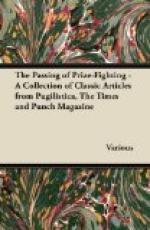* * * * *
In the very improving books which I had to read long ago the hero or heroine usually had a cross to bear. They bore it with great fortitude, and frequently died young. When therefore I opened Mr. JEROME K. JEROME’S All Roads Lead to Calvary (HUTCHINSON) I fancied I knew what to expect. I read that Joan Allway was possessed of remarkable beauty, a “Stevensonian touch” and suitable introductions to editors and newspaper proprietors, and that from the pulpit of a column in the evening Press, with her photograph at the top, she attempted to reform the world. I don’t know how the photograph came out, but there was apparently no martyrdom so far. Afterwards she began to encourage and inspire Robert Phillips, a Labour M.P. and future Cabinet Minister, and at the same time to be kind to and educate Mrs. Phillips, who was good-natured, vulgar and middle-aged. Falling gradually in love with the politician, she withdrew only just in time, nursed in a French hospital, married a journalist friend and settled down happily with him to reform a little bit of the world at a time, and that the part nearest to hand. And now I am left wondering what Joan Allway’s cross was. Would avoiding the Divorce Court be counted the roughest path of self-denial in a moral anecdote of to-day?
* * * * *
Running Wild (SIMPKIN) is the expressive title of a collection of child-memories by the late Mr. BERTRAM SMITH, whom readers of Punch will remember by the pseudonym “BIS.” They can here learn from a sympathetic little introduction by Mr. WARD MUIR under what conditions of a brave but losing battle with ill-health this delicate and vivacious work was written. When I say that these recollections (which I decline to call by any word implying more artifice) illustrate their author, I give you their measure for honesty and charm combined. Honesty first of all; Mr. SMITH’S young barbarians running wild and, one conjectures, rapidly reducing their elders




